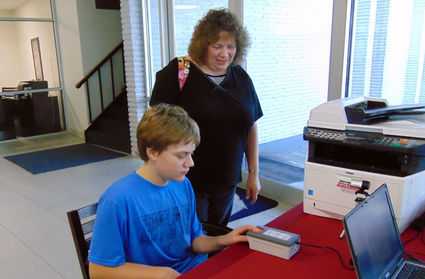Dealership sponsors child safety program
Last updated 10/20/2015 at Noon
Logan Russell, age 13 and a student at St. Mary's Catholic School in Orange, gets fingerprinted and photographed at Operation Kidsafe at Sabine River Ford on October 17. Should a child become lost, or even worse, kidnapped, the parent would call 911 and let law enforcement know they have an Operation Kidsafe document. The police department will know how to handle it from there. RECORD PHOTO: David Ball
David Ball - For The Record
It's not just younger children who need to be fingerprinted and photographed in the event that something goes awry.
Take for instance Logan Russell. Logan is a 13-year-old student at St. Mary's Catholic School in Orange. He attended the Operation Kidsafe screening sponsored by Sabine River Ford at the dealership with his mother, Michelle, on October 17.
Michelle said her husband heard about the screening and recommended their son be fingerprinted and photographed again.
"He's done it before when he was little. He's grown and changed. We thought it was time to do it again," she said.
The Operation Kidsafe system, procedure and layout were developed using consultants from the FBI, police officials and fingerprinting experts, according to their website. Using the latest all digital systems they capture the fingerprints of each hand along with a full digital head and shoulder photograph. The above information is then printed on hard copy and handed to parent for safe keeping. There is an area on the document for parents to update with a current photo.
Operation Kidsafe will not ask for any personal information. They recommend children one year of age and older. They can, however, often times get readable prints on younger babies for parents who want to give it a try.
Pat Camfield, general manager at Sabine River Ford, said a current picture of the child would be easier to use.
Should a child become lost, or even worse, kidnapped, the parent would call 911 and let law enforcement know they have an Operation Kidsafe document. The police department will know how to handle it from there. Don’t forget that the focus of this event is education. With the Operation Kidsafe safety tips, children can avoid many compromising situations.
Parents take the document home, keep it available 24 hours a day. If there is ever an emergency, hand the form to law enforcement.
"It is the perfect time for parents to cover these tips with their children and start a family safety action plan," it read.
As long as the child is with a trusted adult, Operation Kidsafe will provide the service free and private to every family. This service can only be done on site at a local event. Children, grandchildren or an entire school can be registered.
The only record of the visit goes home with the family. The parents get the 8-1/2 x 11 printout with the child’s fingerprints and photo. This document also has safety tips and helps families start a safety action plan.
Also, Operation Kidsafe offers this to anyone including special needs adults that are at risk.
"This document would make it very simple for the authorities to publish (as they deem necessary) for distribution and entry into the National Crime Computer," according to the website.
Some safety tips from Operation Kid Safe and Sabine River Ford is the biggest myth surrounding dangers to children come from strangers. In the majority of cases, the perpetrator is someone the parents may be in a position of trust or responsibility to the child and family.
Parents should choose opportunities or teachable moments to reinforce safety skills. If an incident occurs in the community, and the child asks about it, speak frankly but with reassurance. Explain to children you want to discuss the safety rules with them so they will know what to do if they are ever confronted with a difficult situation. They recommend safety nets are in place so children will know there is always someone who can help them.
Other safety tips for children who are home alone include:
1. Keeping the doors and windows locked.
2. Not opening them to anyone they don't know and trust.
3. Speaking through a closed door or peephole.
4. Never telling anyone they are home alone.
5. Immediately calling their parents or a neighbor if they are afraid.
6. Keeping emergency telephone numbers by the phone.
7. If the person doesn't leave, calling 911 or "O" for operator.
8. Don't hang up until they are told to do so; listen for instructions.
If children are lost:
1. Staying calm and alert.
2. Staying where you are and think.
3. Parents or the child's group may be looking for the child.
4. Giving searchers a chance to find them.
5. If no one arrives soon, looking for a police officer or other trusted adult.
6. Knowing their address and phone number.
7. Finding a telephone and dialing 911.
8. (Pay phones are free for 911 calls.
Furthermore, children should always check first with a trusted adult before they go anywhere, accept anything, or get into a car with anyone. This applies to older children as well. They should not go out alone and should always take a friend with them when they go places or play outside.
It's okay to say no if someone tries to touch them or treats them in a way that makes them feel scared, uncomfortable, or confused and to get out of the situation as quickly as possible. Children need to know they can tell parents or a trusted adult if they feel scared, uncomfortable, or confused.
Children need to know there will always be someone to help them, and they have the right to be safe.
Tricia Slaughter, internet sales manager at the dealership, said the Ford Motor Company continues to give back to the community.
"The safety of our children are our top priority," Slaughter said. "We not just sell vehicles; we're building relationships with our community."















Reader Comments(0)